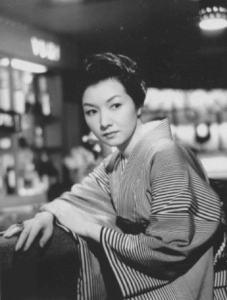Is also my favorite film. And believe me, coming up with a fave is not easy for me. I don’t think I could come up with a favorite book. This film, When A Woman Ascends The Stairs, stands out because I think it’s flawless. I wouldn’t change a frame of it.

The movie came out in 1960 and was directed by a man, Nikio Naruse, who also wrote the screenplay. Was he a feminist dude way ahead of his time? I don’t know. But he has a solid reputation as a filmmaker. This movie works as a movie. It has ongoing conflict both episodic and an overall arc resolved at the end. It has diverse characters, diverse not in the shallow sense of race or gender; diverse in the sense of character. Trying not to give spoilers here, but this film has heroes, villains, fools, nuts and scumbags.
It’s my favorite feminist movie because the source of the conflict and obstacles that the main character Keiko faces is her stifling set of options – woman’s options. She is a bar hostess in a country with the tradition of geisha, and that in itself is complicated. She’s not a prostitute turning tricks every half hour, but neither is she a woman to take home to mother. She is a working woman. Unlike other movies that might call themselves feminist, the heroine’s goal is not to throw off her shackles. Her goal is to support her family and live her life with a little dignity. That’s all, and it’s really hard. The feminist question is, does it have to be?
Hideko Takamine as Keiko is, to use my previous word, flawless.
Personally I don’t see the movie as a statement of sexism in Japan and only Japan. There is much that is familiar, that I see here and I see now. All this current talk about how to navigate work, family, relationships, sexual assault. I love that in this movie, it’s not on the nose, it’s just there. How feminist can you get?
It’s my favorite movie because of the way it treats the subject of integrity, a woman’s integrity. It’s a movie for grownups. There are shades of grey, mistakes, missteps, a flawed world, and – again avoiding spoilers here – an attempt to reflect what life is, what life can be. And how transient things are.